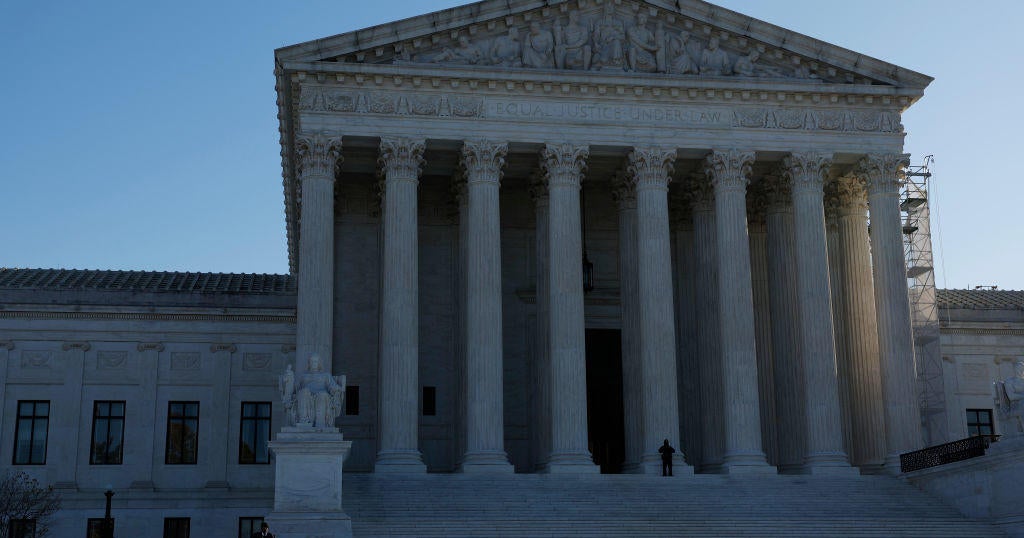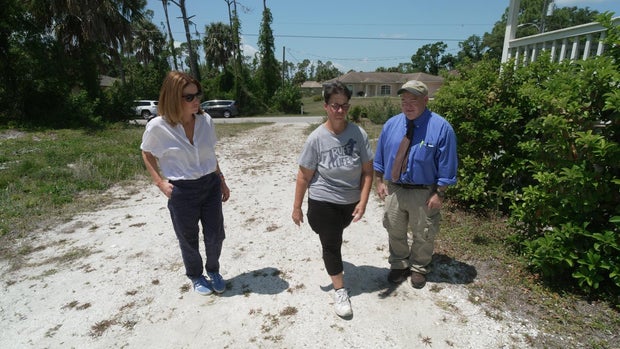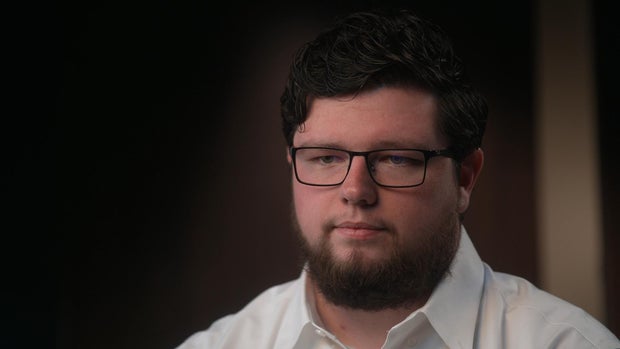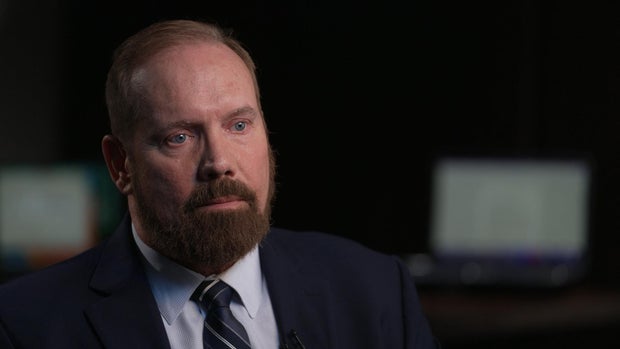CBS News
Florida home hurricane damage reports changed, whistleblowers say | 60 Minutes

Jeff Rapkin admits that he prayed for the “untimely demise” of the adjuster who examined his home after it was devastated by 2022’s Hurricane Ian.
Rapkin, a Florida resident and father, said the adjuster told him his house would likely need to be entirely rebuilt. So Rapkin was shocked when Heritage Property and Casualty Insurance, his insurance company, sent him just $15,000, minus their deductible.
As it turns out, the adjuster, Jordan Lee, was also shocked, as he wrote in his report that he believed the Rapkins were owed $231,368.57. Lee says he later learned dozens of his damage reports had been materially altered.
“It was basically all of them,” Lee said.
Assessing homes after Ian
Intense winds and heavy rainfall caused an estimated $113 billion in damages when Hurricane Ian made landfall in September 2022. The Rapkins had weathered more than a half dozen hurricanes inside their home, but Ian was different, Rapkin said.
“It felt like the hurricane was inside the house,” Rapkin said. “We couldn’t keep the windows closed.”
Video shows the steel roof being ripped from their home during the hurricane. Ian left trees on and around their house. The roof was shredded and everything inside the home was soaked.
60 Minutes
The Rapkins called Heritage after the storm to start the claims process. Heritage sent over Lee, a licensed adjuster since 2017, to assess the damage. After major disasters, most insurance companies use third-party firms that hire adjusters, like Lee, to help them with the thousands of claims.
Lee says he leaves his cellphone number with homeowners after he assesses a house so that they can call him if they have any questions. His phone started ringing after Ian with angry homeowners on the other end.
“Cussin’ me out left and right, up and down. You know, ‘how could you do this to us?'” Lee said. “It was really bad, actually. And out of the thousands of claims that I’ve handled, I’ve never had phone calls like that.”
“Allegations of systemic criminal fraud”
Two years later, whistleblowers, who are all licensed adjusters, say that after Hurricane Ian, several insurance carriers used altered reports to deceive customers and lower payouts.
An estimated 50,000 homeowners impacted by Ian are still fighting with their insurance companies to repair or rebuild their homes. The Rapkins filed a lawsuit against Heritage accusing the company of breach of contract and fraud.
While looking into what went wrong with the Rapkin home, Lee learned a desk adjuster, who had never been to the family home, had deleted entire sections of his report, but left his name and license number on it, making it look like his work.
It is standard procedure for field adjusters to collaborate with those back in the office to make minor edits, but Lee said that’s not what happened with the Rapkin report.
As he dug into his hurricane work, Lee saw 44 of his 46 Ian reports had been adjusted to give the policyholder less money. One estimate he wrote for about $488,000 was changed to approximately $13,000. Another was revised from about $239,000 to around $3,000.
60 Minutes
Lee and two other adjusters testified to Florida lawmakers on Dec. 13, 2022, about what one watchdog group called “systemic criminal fraud” by the insurance companies.
Ben Mandell, a licensed adjuster for a decade, did not work for Heritage, but said 18 of the 20 reports he wrote for another insurance company after Ian were altered. Mandell said that he and other adjusters were instructed by some of their managers to leave damage off of reports.
“It was a deliberate scheme to do this,” Mandell said. “And it wasn’t just with one carrier doing this. This was six carriers that we discovered were doing this in the state of Florida, they all got the memo.”
The directive, according to Mandell, was that insurance companies were increasingly unwilling to replace roofs, and would only repair them. Mandell said what he was being asked to do was illegal.
“It’s illegal because when I go out to make a damage estimate, I have to put what the damage is, not what they want the damage to be,” he said.
Mandell said he was fired after complaining to his bosses. Now he and five other whistleblowers, including Lee, are being represented by attorney Steve Bush, who himself worked as a public adjuster for more than a decade. They were all either fired or left their jobs because of the alterations made to their reports.
“Most people will not stand up and fight”
Some insurance companies are hoping customers will roll over and just accept the money insurers offer them, Bush said. He said he believes some insurance companies are unwilling to fork over cash for a roof replacement unless a policyholder sues.
“Most people will not stand up and fight,” Bush said. “I cannot tell you how many people come to me and say, ‘hey, what was I gonna do? I had to replace my roof.'”
Florida’s insurance market has been a risky gamble for years. After a decade of costly storms, several national carriers exited Florida. Smaller, regional carriers have stepped in, but since 2021, at least nine insurance companies in Florida have collapsed and some of the remaining ones have altered damage reports, Bush said. He says he has evidence of carriers manipulating reports in six different states, with the policyholders none the wiser that they’re not getting the money they deserved.
There’s almost no transparency in the claims process, according to Doug Quinn, executive director of the American Policyholders Association, an advocacy group he started after his home was destroyed by Hurricane Sandy in 2012.
“The victims of insurer fraud are the last people to find out that they were victims of insurer fraud,” Quinn said.
Calling for change, waiting on repairs
Bush turned over what he says is evidence of insurer fraud to state investigators and Florida opened a criminal investigation. But two years after the storm, Florida has made no arrests.
“If you really want to see change in the industry, put somebody in handcuffs,” Bush said.
According to Quinn, insurance cases are investigated and prosecuted quickly and aggressively when it’s a policyholder or public adjuster trying to cheat the insurance industry.
“All we are asking is that cases that are alleged to be perpetrated by the insurance carriers or the vendors that they hire are just as aggressively investigated and prosecuted when fraud is found,” Quinn said.
60 Minutes
Quinn said it’s difficult to know how many policyholders may have been given less money than they were owed.
But two years after Hurricane Ian, every unrepaired home and tarp tells a story.
At the Rapkins’ home, mold and mother nature are gnawing away at what’s left. The home’s split roof is an open wound for the family, who still have to mow the lawn and make mortgage payments on their rotting home every month. They’re also paying rent on an apartment nearby and $4,000 a year to Heritage for home insurance, even after the premiums went up.
“And can’t get another insurance company, obviously,” Rapkin said.
Rapkin originally believed there may have been an innocent mistake made, but he no longer feels that way.
“This is a con. That’s what this is,” he said. “This is, ‘make them go away at all costs. We’re not paying.'”
Heritage responds
In a statement to 60 Minutes, Heritage said it couldn’t comment on specific policyholders but aims to “pay every eligible claim” and had no intention to deceive. The company says, in its own random sample, about 42% of damage reports were revised downward and 26% were revised upward.
Heritage says that since hurricane Ian, it has made “many reforms,” including updating its claims processing software, which it blames for not including the names of desk adjusters who altered reports.
CBS News
What to know about the charges in UnitedHealthcare CEO’s killing

Watch CBS News
Be the first to know
Get browser notifications for breaking news, live events, and exclusive reporting.
CBS News
Prominent pro-Putin ballet star Sergei Polunin says he’s leaving Russia

Moscow — Former Royal Ballet star Sergei Polunin, famous for his tattoos of Russian President Vladimir Putin, on Wednesday announced that he plans to leave Russia. The Ukrainian-Russian dancer was one of the most prominent stars who backed Russia’s unilateral 2014 annexation of Crimea and its military assault on Ukraine. He was rewarded with prestigious state posts.
In a rambling, misspelled message on his Instagram account, Polunin wrote: “My time in Russia ran out a long time ago, it seems at this moment that I have fulfilled my mission here.”
The post first appeared Sunday on his little-read Telegram account.
Ian Gavan/Getty
Polunin, 35, did not give a specific reason for leaving but said that “a time comes when the soul feels it is not where it should be.”
He said he was leaving with his family — his wife Yelena and three children — but “where we will go is not clear so far.”
In the summer, the dancer complained of a lack of security and said he was being followed.
Polunin, who was born in Ukraine, backed Putin’s 2014 annexation of Crimea — a prelude to the ongoing, full-scale invasion of Ukraine that Putin launched in February 2022.
The dancer was granted Russian citizenship in 2019. He was appointed acting head of a dance academy in occupied Crimea’s biggest city, Sevastopol, and director of the city’s opera and ballet theatre, for which a large new building is under construction.
Just last year he was decorated by Putin for his role in popularizing dance. But in August he was replaced as head of the dance academy by former Bolshoi prima Maria Alexandrova, and a week ago, Russia’s arts minister Olga Lyubimova announced his theater director job would go to singer Ildar Abdrazakov.
This came after on December 9 Polunin published a social media post saying he was “very sorry for people” living in the heavily bombarded village near Ukraine’s city of Kherson, where his family originates from, and that “the worst deal would be better than war.”
Ian Gavan/Getty
Aged 13, Polunin won a scholarship to train at the Royal Ballet School in London and became its youngest ever principal dancer.
With his tattoos — including a large depiction of Putin’s face emblazoned prominently on his chest — and his rebellious attitude, he became known as the “bad boy of ballet” and caused a sensation by resigning from the Royal Ballet at the height of his fame in 2012.
Later he made a 2015 hit video to Irish musician Hozier’s song “Take Me to Church” and was the star of a 2016 documentary called “Dancer.”
He moved to perform at Moscow’s Stanislavsky Musical Theatre’s ballet before launching a solo career, starring in dance performances in roles including the mystic Grigory Rasputin.
In 2019 he posed for AFP with a large tattoo of Putin on his chest which he later supplemented with two Putin faces on either shoulder. He also has a large Ukrainian trident on his right hand.
This year he took part in Putin’s campaign for reelection as a celebrity backer.
CBS News
Supreme Court takes up South Carolina’s effort to defund Planned Parenthood

Washington — The Supreme Court on Wednesday agreed to consider South Carolina health department’s effort to cut off funding from Planned Parenthood because it performs abortions, wading into another dispute over access to the procedure in the wake of its reversal of Roe v. Wade.
The case, known as Kerr v. Edwards, stems from the state’s decision in 2018 to end Planned Parenthood South Atlantic’s participation in its Medicaid program. Gov. Henry McMaster, a Republican, directed the South Carolina Department of Health and Human Services to deem abortion clinics unqualified to provide family planning services and end their Medicaid agreements.
Planned Parenthood operates two facilities in the state, one in Charleston and the other in Columbia, and provides hundreds of Medicaid patients with services like physicals, cancer and other health screenings, pregnancy testing and contraception. Federal law prohibits Medicaid from paying for abortions except in cases of rape or incest, or to save the life of the mother.
Planned Parenthood and one of its patients, Julie Edwards, sued the state, arguing that cutting off its funding violated a provision of the Medicaid Act that gives beneficiaries the right to choose their provider.
A federal district court blocked South Carolina from ending Planned Parenthood’s participation in its Medicaid program, and a U.S. appeals court upheld that decision, finding that Edwards could sue the state to enforce the Medicaid Act’s free-choice-of-provider requirement.
The legal battle has already been before the Supreme Court in the past, with the high court last year ordering additional proceedings after deciding in a separate case that nursing home residents could sue their state-owned health care facility over alleged violations of civil rights.
After reconsidering its earlier decision, the three-judge appeals court panel ruled unanimously in March that Edwards’ lawsuit against the state could go forward and said South Carolina couldn’t strip Planned Parenthood of state Medicaid funds.
“This case is, and always has been, about whether Congress conferred an individually enforceable right for Medicaid beneficiaries to freely choose their healthcare provider. Preserving access to Planned Parenthood and other providers means preserving an affordable choice and quality care for an untold number of mothers and infants in South Carolina,” Judge Harvie Wilkinson wrote for the 4th Circuit panel.
South Carolina officials asked the Supreme Court to review that decision, marking the third time the case has been before the justices. The justices agreed to take up the question of whether “the Medicaid Act’s any-qualified provider provision unambiguously confers a private right upon a Medicaid beneficiary to choose a specific provider.”
South Carolina is among the more than two dozen that have passed laws restricting access to abortion in the wake of the Supreme Court’s June 2022 decision reversing Roe v. Wade. In South Carolina, abortion is outlawed after six weeks of pregnancy with some exceptions.
Several states have also enacted laws blocking Planned Parenthood from receiving Medicaid funding, including Arkansas, Missouri, Mississippi and Texas.














